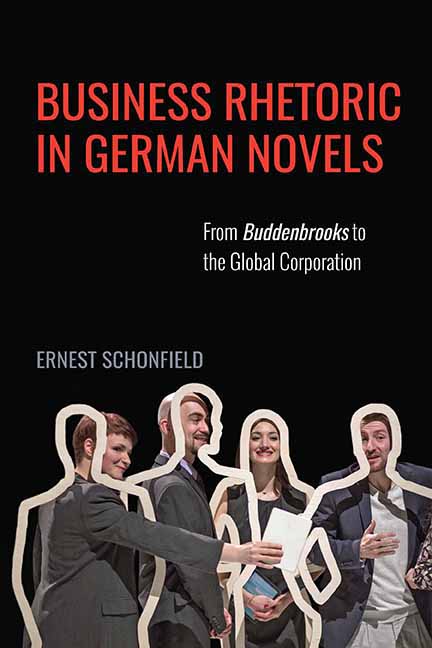Book contents
- Frontmatter
- Dedication
- Contents
- Acknowledgments
- List of Abbreviations
- Introduction
- 1 Managing Appearances in Thomas Mann's Buddenbrooks, 1901
- 2 Oratory and Publicity in Heinrich Mann's Der Untertan, 1914/18
- 3 Organizing Speech in Gabriele Tergit's Käsebier erobert den Kurfürstendamm, 1931
- 4 Seeing through the Rhetoric in Bertolt Brecht's Dreigroschenroman, 1934
- 5 Giving an Account of the Self in Ingeborg Bachmann's Malina, 1971
- 6 Negotiating Bureaucracy in Hermann Kant's Das Impressum, 1972
- 7 Corporate Discourse in Friedrich Christian Delius's Unsere Siemens-Welt, 1972
- 8 Producing Ethos in Kathrin Röggla's wir schlafen nicht, 2004
- 9 Communicative Contests in Philipp Schönthaler's Das Schiff das singend zieht auf seiner Bahn, 2013
- Conclusion
- Notes
- Bibliography
- Index
3 - Organizing Speech in Gabriele Tergit's Käsebier erobert den Kurfürstendamm, 1931
Published online by Cambridge University Press: 15 August 2018
- Frontmatter
- Dedication
- Contents
- Acknowledgments
- List of Abbreviations
- Introduction
- 1 Managing Appearances in Thomas Mann's Buddenbrooks, 1901
- 2 Oratory and Publicity in Heinrich Mann's Der Untertan, 1914/18
- 3 Organizing Speech in Gabriele Tergit's Käsebier erobert den Kurfürstendamm, 1931
- 4 Seeing through the Rhetoric in Bertolt Brecht's Dreigroschenroman, 1934
- 5 Giving an Account of the Self in Ingeborg Bachmann's Malina, 1971
- 6 Negotiating Bureaucracy in Hermann Kant's Das Impressum, 1972
- 7 Corporate Discourse in Friedrich Christian Delius's Unsere Siemens-Welt, 1972
- 8 Producing Ethos in Kathrin Röggla's wir schlafen nicht, 2004
- 9 Communicative Contests in Philipp Schönthaler's Das Schiff das singend zieht auf seiner Bahn, 2013
- Conclusion
- Notes
- Bibliography
- Index
Summary
Non omne quod nitet aurum est. [All that glitters is not gold.]
—ProverbIntroduction: Liberal Critique
GABRIELE TERGIT (1894–1982), born Elise Hirschmann, was a respected journalist and court correspondent for the Berliner Tageblatt (Berlin Daily News) from 1924 to 1933. Käsebier erobert den Kurfürstendamm (1931; Käsebier Conquers the Kurfürstendamm), her first novel, is set against the background of the Wall Street crash of October 24, 1929, and its devastating consequences for Germany. The novel is also informed by a Berlin corruption scandal that began on September 26, 1929. The three Sklarek brothers, clothing retailers, had a government contract to supply clothes for civil servants; they forged receipts somewhere in the region of ten million marks. The scandal provided considerable fuel for National Socialist propaganda. In early 1932 Tergit reported on the trial of Moritz Rosenthal, a business partner of the Sklareks, pointing out that he was at the same time an administrator and beneficiary of public funds. The emerging details of the Sklareks’ backroom deals certainly influenced the composition of Käsebier. The novel depicts German liberalism in crisis. The collapse of the monarchy in 1918 had led to a “Sinnkrise” (crisis of meaning) for the educated middle classes, as they lost the special entitlement they had enjoyed in the Wilhelmine state; the idea of Bildung was stripped of its prestige and was replaced by the worship of money. That year the liberal author Carl Sternheim commented on the intellectual bankruptcy of the German nation, remarking
daß alle Welt in Deutschland von der obersten Spitze bis zum letzten Arbeiter entschlossen stand, jeden menschlichen und mitmenschlichen Akt von seiner ziffernmäßigen Bedeutung abhängig zu machen, das heißt einfach jedes Geschehen nach seinem pekuniären Erfolg wertete.
[that every social class in Germany, from the highest elite to the lowest worker, was determined to judge every human action in terms of its profitability, put simply, to judge every event in terms of its financial return.]
Sternheim argues that humanist values such as Geist (a term that combines aspects of “intellect” and “spirit” and will henceforth be left untranslated) and Bildung have been replaced with economic rhetoric:
Allmählich schwand natürlich auch die Fähigkeit, mit Geist überhaupt umzugehen. Die Sprache bildete nur für wirtschaftliche Phänomene noch ausreichende Begriffe und damit war etwas anderes als Ökonomisches in Deutschland überhaupt nicht mehr lebendig.
- Type
- Chapter
- Information
- Business Rhetoric in German NovelsFrom Buddenbrooks to the Global Corporation, pp. 57 - 77Publisher: Boydell & BrewerPrint publication year: 2018

